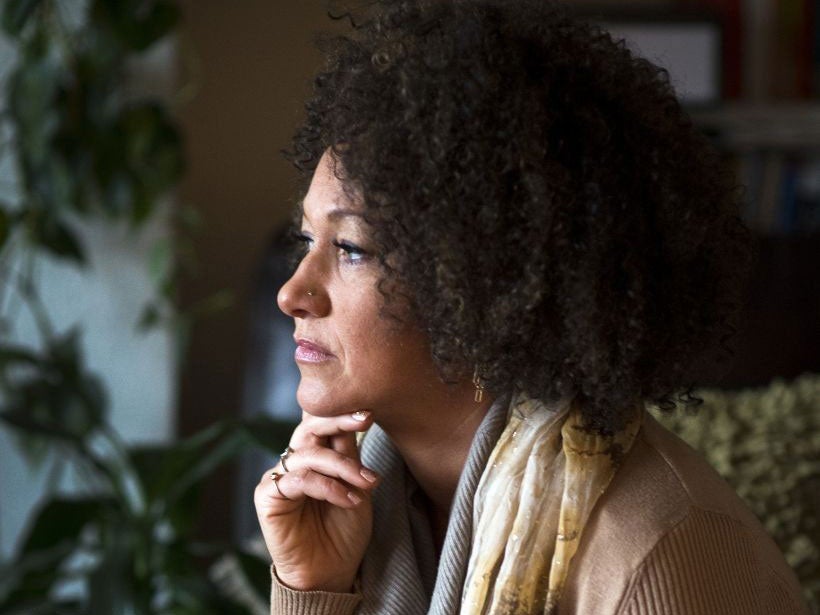Rachel Dolezal: As a mixed race woman, I know that culture and skin colour are different things
It’s problematic for your own sense of self when your exterior appearance doesn’t quite match the person you consider yourself to be


In 1963, Martin Luther King said “I have a dream that my four little children will one day be judged not by the colour of their skin but by the content of their character”. In 2015, civil rights activist Rachel Dolezal decided that the only way she could convey the true content of character to the world was to change the colour of her skin.
But, did Dolezal, a woman born white who fooled her community into believing she was of African American descent by changing the colour of her skin and hair and posing with a random black colleague claiming he was her father, do anything wrong? Listening to Petrie Hosken’s LBC Radio show yesterday, callers (the majority of whom identified themselves as black) tended to fall into two camps – those who believed Dolezar to be a fraud and her actions to be an insult to their community , and those who were flattered that she has so much reverence for African American culture and who couldn’t see any harm in what she had done.
What has not been fully acknowledged in any of the commentary I have seen, though, is that race and culture are not the same thing (although the topic was touched upon in Ellen E Jones’ brilliant piece for the Independent on Sunday). Of course our personalities are influenced by where we live and the cultural influences we are exposed to, but one cannot make sweeping assumptions about what those influences might be based on the shade of the person’s skin. My favourite contributor to Petrie’s show, a Caribbean lady called Mary, pointed out that her three mixed race children were each totally different colours and remarked pithily that, for reasons she didn’t quite understand, one of them ‘looked Chinese’. To judge Mary’s three children as different from one another based on nothing more than their skin tone is racism, and yet they probably are treated differently, which is what makes Rachel Dolezal’s actions somewhat understandable.
It’s problematic for your own sense of self when your exterior appearance doesn’t quite match the person you consider yourself to be. I know this as a mixed race woman who doesn’t really look it. Yet I never thought the solution to my own internal struggles was to get an uber-perm and a heavy duty spray tan. I always considered that to make assumptions about a person based on the colour of their skin, whilst commonplace, was entirely wrong. So why would I further exacerbate those tendencies by changing my appearance just so people would make the ‘right’ set of assumptions?
I understand that people who look black and mixed race have experienced prejudice I can never truly understand. As someone with light skin I am privileged, something of which I am acutely aware. When I was three, my mother met and married a black man originally from Sierra Leone, and went on to have two children with him. That was when my identity as a mixed race person was cemented, because I never saw myself as particularly different from my brothers who, whilst a couple of shades darker than me, have the same Mum, grew up in the same house, in the same area and where exposed to the same cultural influences. People often tell me I sing and dance ‘like a black woman’ and whilst that’s a little ignorant, it’s hardly comparable with the time my brother was told he ‘didn’t belong in a school with white children’.
Rachel Dolezar meandered into ‘wrong’ territory when she reportedly gave entirely fabricated lectures on what it was like to grow up as a woman of colour and the prejudice she faced. It’s an insult to anyone who has genuinely been judged for nothing more than the random circumstances of their birth to claim you are persecuted for something you can scrub off at the end of the day.
Yet being a white woman doesn’t mean that Dolezal wasn’t fit to hold her position as Spokane’s NAACP President. Skin colour does not tell the outsider anything about your story, your values or your expertise.
I’m prepared to accept that Dolezal, as a woman who grew up in a mixed race family, interacts mainly within the African American community and went on to study African art, has identified herself as culturally black. She should not have had to reassign her race in order to embrace that. Yet in the current climate, her actions aren’t fraud, they’re a reflection of our human tendency to judge too quickly. Genuine progress will come when we can respect people’s cultural identity, but not assume it is based on their race - when we can judge people by getting to know them on “the content of their character” not “the colour of their skin”.
Join our commenting forum
Join thought-provoking conversations, follow other Independent readers and see their replies
Comments